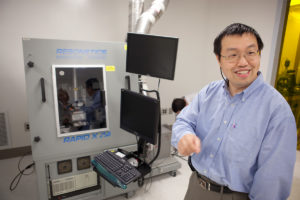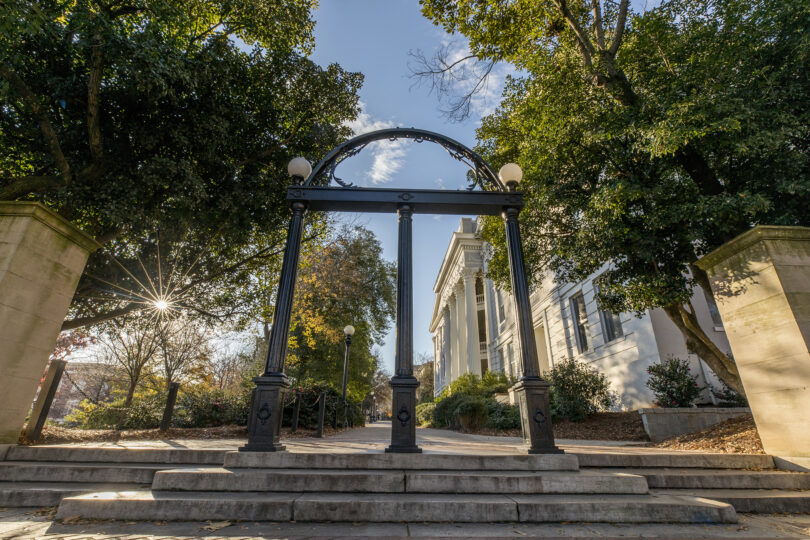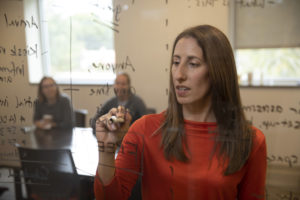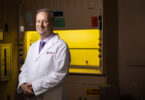How can nanotechnology and big data be used to improve diagnosis of infectious viruses like SARS-CoV-2?
That’s one of the questions that will be explored through funding provided by a third round of Presidential Interdisciplinary Seed Grants.
Eleven grants totaling $1.5 million were awarded in November 2021 to recipients of the third round of Presidential Interdisciplinary Seed Grants. Overall the awards went to faculty from 13 UGA departments, centers, programs, schools and colleges.
The program launched in 2017, with a second round of grants in 2019, through a partnership between UGA Research and UGA Public Service and Outreach. Teams in the first two rounds were highly successful at winning external funding to pursue the work initiated through these seed grants.
“I am pleased with the continued success of this program as the University of Georgia seeks ways to grow our research enterprise and expand the impact of our faculty,” said President Jere W. Morehead. “Research funding opportunities such as the Presidential Interdisciplinary Seed Grants are investments in the future of our state, nation and world as well as our university.”
In all, 89 faculty teams submitted research proposals in round three, targeting significant challenges at the local, national or global level that align with the goals in UGA’s 2025 Strategic Plan. Examples include areas identified by the Provost’s Task Force on Academic Excellence (precision agriculture, security, climate and environment, brain and behavioral sciences, and data science and AI), as well as those requiring close collaboration between social/behavioral and biomedical faculty.
“UGA faculty are finding creative ways to explore challenges that affect our daily lives,” said Karen Burg, vice president for research. “We’re looking forward to seeing how their collaborations across subject areas result in novel approaches and innovative solutions.”
A project co-led by Lisa Renzi-Hammond and Jenay Beer will develop a UGA center focused on countering state-wide disparities in prevention and access to health care for Alzheimer’s disease and related dementias (ADRD).
“ADRD will place a $1 trillion annual burden on the health care system by 2050,” said Renzi-Hammond, co-primary investigator and associate professor in the College of Public Health. “Rural Georgia has limited education and programming to prevent ADRD, limited opportunities to join clinical research and limited access to diagnosis and support resources, but risk factors—older age, poor nutrition, poverty, co-morbidities, obesity, etc.—are more prevalent.”
“We envision a Georgia in which everyone has access to early and accurate diagnosis and treatment,” said Jenay Beer, co-primary investigator and associate professor in the College of Public Health and School of Social Work. “To achieve this goal, we created the Cognitive Aging Research and Education Center, which will provide state-wide community dementia prevention education, health care provider education, and development of digital health infrastructure for diagnosis, as well as geographically and culturally tailored post-diagnosis support, linkage to care and treatment, and opportunities to participate in cutting-edge research.”

Assistant professor Jenay Beer sits next to an interactive companion robot. (Photo by Peter Frey/UGA)
The team has already begun offering dementia education workshops in four Archway Partnership communities—Grady, Hart, McDuffie and Washington counties. This funding will expand their program to two additional Archway communities. The Archway Partnership is a UGA Public Service and Outreach unit.
Renzi-Hammond and Beer are core faculty at UGA’s Institute of Gerontology. The team also includes Denise Dixon Everson (UGA Extension, College of Agricultural and Environmental Sciences); Bernadette Heckman (College of Education); Donald Scott (Augusta University/UGA Medical Partnership); Sharon Liggett (Archway Partnership); Devin Lavender (College of Pharmacy); Timothy Heckman and Grace Bagwell Adams (College of Public Health); Lawrence Sweet (Franklin College of Arts and Sciences); Alexander Scherr (School of Law); and Tiffany Washington (School of Social Work).
“I am encouraged by the number of faculty from across campus who will collaborate to address some of the challenges in our state,” said Jennifer Frum, vice president for Public Service and Outreach. “Part of UGA’s mission, as the state’s land-grant and sea-grant institution, is to extend our knowledge and expertise to help communities thrive.”

Yiping Zhao is Distinguished Research Professor of Physics in UGA’s Franklin College of Arts and Sciences. (Photo by Andrew Davis Tucker/UGA)
One project, led by primary investigator Yiping Zhao, aims to combine nano-optics and machine-learning techniques to develop a rapid, portable and cost-effective point-of-care method to detect viruses—such as SARS-CoV-2—and bacterial infections in patients.
“Mitigating epidemic and pandemic diseases like COVID-19 will require improved diagnostic methods,” said Zhao, Distinguished Research Professor of Physics in the Franklin College of Arts and Sciences. “Preliminary results have shown that our approach can deliver direct and differential detection of important respiratory viruses within 20 minutes.”
Zhao’s team includes Ralph Tripp and Hemant Naikare (College of Veterinary Medicine), Xianyan Chen (Franklin College of Arts and Sciences) and external collaborators.
Additional proposals that received Presidential Interdisciplinary Seed Grant funding include:
- “Integrated Approaches to Address Current and Future High Consequence Biological Agents.” Franklin E. Leach III (primary investigator, College of Public Health, Complex Carbohydrate Research Center); Fred Quinn, Danny Mead, Jeff Hogan and Eric Lafontaine (College of Veterinary Medicine); and Ryan Weiss and Michael Tiemeyer (Franklin College of Arts and Sciences, CCRC).
- “The THRIVE Project: Development of a Mother-Centered ‘Lay Doula’ Communication Intervention to Improve Black Maternal Outcomes.” Soroya McFarlane (primary investigator, Franklin College of Arts and Sciences); Andrea Swartzendruber and Tamora Callands (College of Public Health); and external collaborators.
- “From AI Ethics to AI Aesthetics: Artificial Intelligence and Aesthetic Harm.” Aaron Meskin (primary investigator, Franklin College of Arts and Sciences); Pengyuan Wang, Rosanna Smith and Carolina Salge (Terry College of Business); David Saltz, Isabelle Wallace and Katie Geha (Franklin College of Arts and Sciences); and Anna Abraham (College of Education).
- “Molecular Level Biodosimetry for National Security: Proteomic, Glycomic, Epigenetic and Metabolomic Approaches for Quantitative Assessment of Low-Dose Radiation Exposure.” Olin “Gene” Rhodes (primary investigator, Savannah River Ecology Laboratory, Odum School of Ecology); Franklin Leach (College of Public Health, Complex Carbohydrate Research Center), Michael Tiemeyer and Lance Wells (Franklin College of Arts and Sciences, CCRC); and Ben Parrott (SREL, Odum School of Ecology).
- “Evaluating the Agrivoltaic Potential of Emerging Perovskite-Based Solar Cells for Greenhouse Applications.” Susanne Ullrich (primary investigator, Franklin College of Arts and Sciences); Tho Nguyen (Franklin College of Arts and Sciences), Marc van Iersel (College of Agricultural and Environmental Sciences), Maric Boudreau and Richard Watson (Terry College of Business), and Tom Lawrence (College of Engineering).
- “An Interdisciplinary School-Based Health Center in Partnership with the Clarke County School District, the University of Georgia and the Augusta University/University of Georgia Medical Partnership.” (Suzanne Lester, primary investigator, AU/UGA Medical Partnership); Theresa Rohr-Kirchgraber, Carrie Kelly, Marguerite Tresa Chappell, Lia Bruner and Jean Chin (AU/UGA Medical Partnership); Edward Delgado-Romero (College of Education); Megan Ford (College of Family and Consumer Sciences); and Jason Cade (School of Law).
- “Georgia Aflatoxin Research and Mitigation Center of Excellence.” (Harald Scherm, primary investigator, College of Agricultural and Environmental Sciences); Thirimachos Bourlai, Jaime Camelio and Changying “Charlie” Li (College of Engineering); Robert Kemerait, Cristiane Pilon, Glen Rains and George Vellidis (College of Agricultural and Environmental Sciences); and Alicia Peduzzi (Warnell School of Forestry and Natural Resources).
- “Bloom and Doom: Is Increasing Risk of Harmful Algal Blooms an Inevitable Consequence of Global Change? Assessing Risk and Exploring Strategies in Georgia from Biological and Social Perspectives.” (Cory Struthers, primary investigator, School of Public and International Affairs); Peter Hazelton (Warnell School of Forestry and Natural Resources); Michelle Ritchie (College of Public Health); and Alex Strauss and Krista Capps (Odum School of Ecology).
- “Developing New Storm Design Criteria for Natural Hazards Planning Research and Practice.” (Scott Pippin, primary investigator, Carl Vinson Institute of Government, a UGA Public Service and Outreach unit); Brian Bledsoe (College of Engineering); Marshall Shepherd, John Knox, Pam Knox, Lynne Seymour and Thomas Mote (Franklin College of Arts and Sciences); and Michelle Ritchie (College of Public Health).








